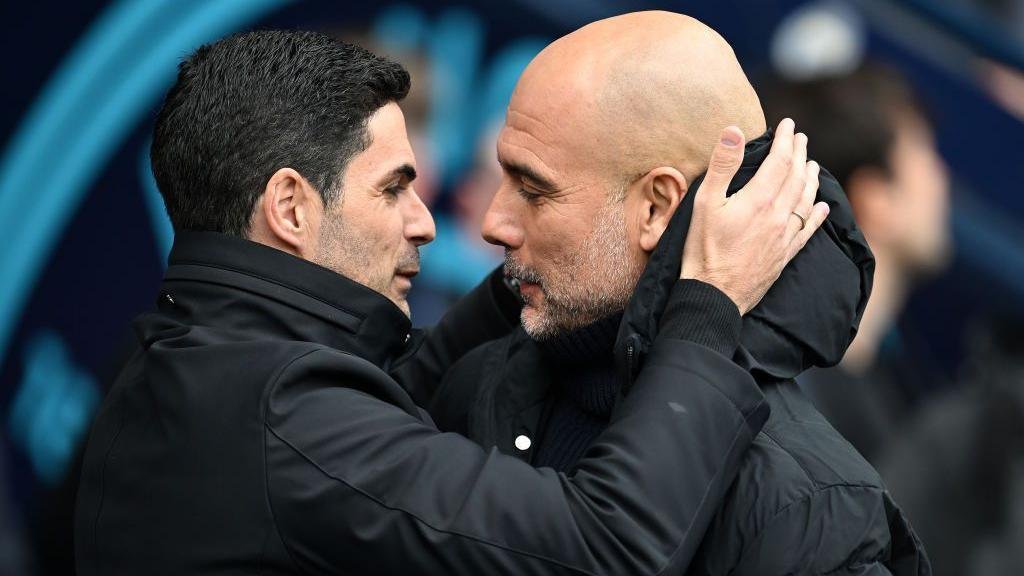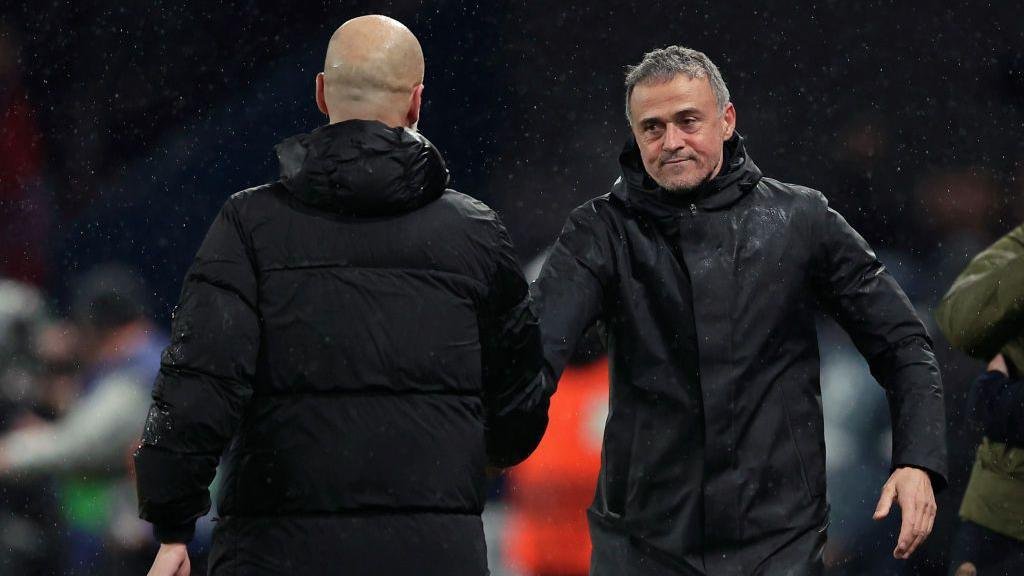
- 48 minutes ago
The model of football that has come to define our era – often associated with Pep Guardiola, who expanded on what he learned from Johan Cruyff and Louis van Gaal – is not only the most prominent today, but also the one shaping the present and future of the game.
Guardiola didn’t invent ‘juego de posicion’ – or positional football – but he developed it further than anyone before him, laying the foundation for a new cultural framework. And whether we like it or not, it has already taken over.
Indeed, three of Guardiola’s disciples – Luis Enrique, Mikel Arteta and Hansi Flick – find themselves in this week’s Champions League semi-finals. The Guardiola way will again be on show at the business end of Europe’s biggest club competition.
There has been growing resistance to this model. Critics argue that it turns players into robots, removes spontaneity and asks defenders to behave like midfielders.
Some fans and pundits feel it’s overcoached, overly structured, and lacking the chaos and excitement of “real football”.
But perhaps that resistance is missing the broader picture – or reacting not to the model itself, but to poor implementations of it.
Let’s look at the facts. Five of the eight Champions League quarter-finalists this season played a version of positional football. Clubs across Europe – even traditional powerhouses like Liverpool and, eventually, Manchester United under Ruben Amorim – are gravitating towards it.
It produces brilliant games, particularly in European competition, where elite coaches and players amplify its potential. More than just a style, it’s a winning model.
Most importantly, it’s a cultural force. Clubs are hiring managers who believe in it, academies are shaping players to fit it, and football education globally is being reoriented around it.
Not everyone gets it right. But that’s always been true in football. Not every team in the 1970s could play like Nottingham Forest or Liverpool – but many tried, because those styles defined their time. Every era has a prevailing model, and it’s natural that most teams move towards it.
We’re emerging from a footballing culture best summarised as: structured at the back, freedom up front. In other words, we train the defence and leave the attack to the imagination of the forwards.
That’s changing, but cultural shifts take time. The new footballing paradigm is settling in, but hasn’t fully taken hold yet.
 Getty Images
Getty ImagesThe attacking phase can be broken down into three stages: the build-up, the construction and the finishing. The French even refer to an additional phase – the preparation of the final pass – which sits between construction and finishing. But for the purpose of this discussion, let’s stick with three.
When Guardiola began coaching in 2001, his focus was on the build-up phase. The famous conversation with Victor Valdes, in which Valdes thought his manager had gone mad for asking him to pass to centre-backs who didn’t want the ball, is now part of football folklore. A landmark moment in the evolution of the game.
After the 2010 World Cup in South Africa, and especially following the rule change in 2019 that allowed players to receive the ball from a goal-kick from inside the penalty area, training the build-up phase became not just common practice, but a fundamental pillar of modern football.
The construction phase – managing the middle third – has taken longer to spread, but Guardiola had already started developing it at Barcelona, and refined it further at Bayern Munich and Manchester City.
The finishing phase, however – the final act of an attacking move – remains largely unorganised. Football still hasn’t figured out how to fully systematise it. The culture of the game, among players and coaches alike, isn’t quite ready for it. But one day, a new revolutionary will come along and advance that final phase. That’s the history of football.
For now, we have brilliant practitioners perfecting the model as it stands – as well as the three semi-finalists, Unai Emery and even Enzo Maresca are two more. Roberto de Zerbi had started to push the boundaries, but his progress has stalled.
“Pep has been a reference for all of us who want to play football in a certain way… You always learn by watching his teams play. Always,” said Paris St-Germain manager Luis Enrique.
“Working alongside him changed the way I see football. He gave me the tools to be a coach,” said Arsenal’s Arteta.
“Pep influenced me a lot. He has an incredible ability to organise the game, to control space and to constantly find new solutions. Watching him train Bayern was an eye-opener. He’s one of the greatest thinkers football has ever had,” added Barcelona’s Flick.
 Getty Images
Getty ImagesMuch of the criticism towards positional football is rooted in frustration: “If we can’t do it well, let’s not do it at all.”
But that’s not how progress works. Just because only the top teams can currently execute the model exceptionally well doesn’t mean it’s flawed. It means we’re watching football in transition. The conversation shouldn’t be “this doesn’t work”, rather “how can we implement it better?”
It’s easy to romanticise the past, to argue that football used to be more spontaneous, more human. But the truth is football today is better. More complex, more collective, more intelligently designed. It’s harder to coach, harder to play and, when done well, arguably more beautiful to watch.
That’s why managers like Emery are so fascinating. He challenged his own beliefs, read the evolution of the game and adapted. He embraced positional principles not because of ideology, but because they offered greater control, clarity and consistency – even without elite-level players.
That kind of flexibility is brave. Not every manager can do it. Not every player can either. But I admire clubs that choose to live in the now, rather than clinging to what worked then.
Why shouldn’t defenders like Virgil van Dijk, Pau Torres or Pau Cubarsi touch the ball more than midfielders? Why can’t they be the architects of the play? Why can’t they be the role models for a new generation of defenders?
Even PSG, a club historically reliant on individual brilliance, has adopted positional ideas in attack – making sure they’re prepared to press the instant they lose the ball.
The hardest thing in football, as in life, is to look forward and imagine what’s next. It’s far easier to look back and say “that was better”.
I don’t pretend to know what football will look like in a decade. But I listen to those who do. And I believe positional play is the present – and the future.
We are in the middle of a cultural shift. Some managers are trying to copy the model. Some are succeeding. Others are still learning. And yes, some are resisting altogether.
But in five years almost everyone will be playing some version of positional football. Not because they’ll be forced to, but because football doesn’t wait for those who refuse to evolve.
The next generation of coaches is already fluent in its language. And soon it will be universal.
We’re not asking every restaurant to be Michelin-starred. But we are asking them to stop serving frozen food.
Let’s not fight the model. Let’s enjoy the process. Let’s celebrate the teams trying to get it right – mixing structure with their own cultural identity – instead of dismissing them because they’re not Guardiola’s City.
A new football culture has taken over – and it’s here to stay.





